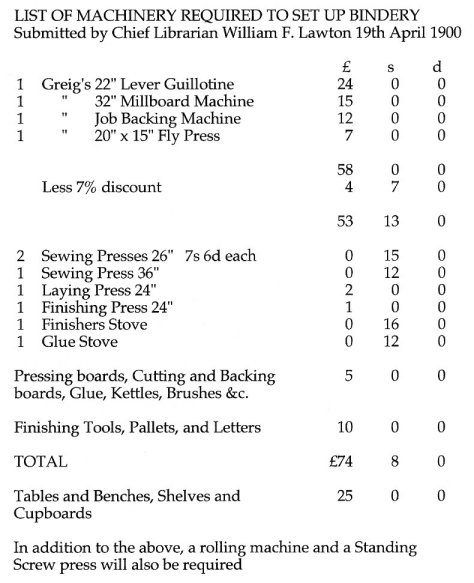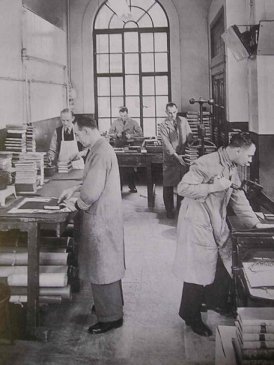
Volume 20 - Autumn 2005
The Municipal Libary Bindery, The Hull Bindery
by Stephen Ingram
Three articles concerning the state of Library binding were published in the August 2005 edition of the 'Society of Bookbinders' Newsletter. They are reprinted here with the kind permission of the respective authors and the Society.
On 26th March 1900 it was suggested to the Public Library committee of Hull City Council of "the desirability of employing their own binders", and that "the work, being done under their own superintendence, would be more satisfactory than done under contract, at a similar cost."
The motion was carried and a sum of £300 committed. The appointment of the first foreman binder initially caused protests from the local bookbinders union as the proposed salary was below the agreed minimum rate. The post had to be re-advertised with an increase in salary of 35/- per week and on 11th May 1900 Mr Ferdinand Drewry was duly appointed foreman.
Production steadily increased from 3623 books in 1901 to 23,000 in the 1960's and the bindery "never failed to save considerably on trade prices".

It should be noted, that the Greig machines listed here are still in use today.
In 1949 a paper was given to the Library Association conference, at Eastbourne by the Chief Librarian Mr James Cranshaw. Cranshaw announced a new development in Library binding technique. An old process known as "Perfect" binding had been tested at Hull using a new adhesive called Polyvinyl Acetate. The books are trimmed the entire way round, endpaper attached and then clamped in a purpose made press. The spines then being roughened with a file or rasp and the adhesive brushed on. After a few minutes the books are removed and a piece of good quality mull was added and then the book was lightly rounded and backed. It was estimated that the new technique could be applied to 66% of modern book papers. Records from 1949 show that it reduced the price of a full cloth library binding from 3/8 to 2/6 per volume, but for some reason "Bostick" became the preferred adhesive.
Being a Local Authority bindery, Hull like others in the country had to provide value for money and funding for new machinery was not easily available. The commercial binderies, on the other hand could and did invest in this new machinery and slowly gained the advantage, increased their productivity and brought the price of a rebind down to less than £4 per volume.

Library Binderies by R.F. Drewery, 1950
The introduction by the government of CCT (commercial competitive tendering) in the 1980's had the effect of driving down the price of a rebind and more and more books where been sent to commercial binderies. The in house binderies where becoming increasingly squeezed out the market and could no longer compete on price but upon quality and convenience.
The last "nail in the coffin" however appeared in 1991. The then government instigated a policy that was to have severe repercussions on the services provided by Local Authorities, including libraries and their binderies. It was called "Best Value" and forced councils to shop around for the cheapest and best value for goods and services.
One by one councils across the country closed their binderies and sent their books to the commercial binderies.
Today as far as I know, only two City Council library binderies now survive, Hull and Liverpool. Hull Bindery survives because it has been able to adapt to this new market whilst having a sympathetic and committed management. Private work has increased greatly and we now bind and restore books from a wide range both local and national collections.
We cannot stress enough how indebted we are to the Society of Bookbinders who have helped us introduce many new and lost (due to retirement) techniques and are proud to say the quality of bookbinding has never been higher.
The future too looks bright with the department currently looking forward to being incorporated into a new "history centre" where it will be close to the collections it cares for as well as having up to date archival storage for the works it handles.
Nigel Jury, the editor of the SoB Newsletter wrote: Shocked by Stephen's dire prediction I sought verification from an independent source of just what shrinkage is taking place. David Lanning is well placed as supplier to the trade and President of the Institute of Bookbinders and Allied Trades, and he kindly furnished the worrying article which follows.
